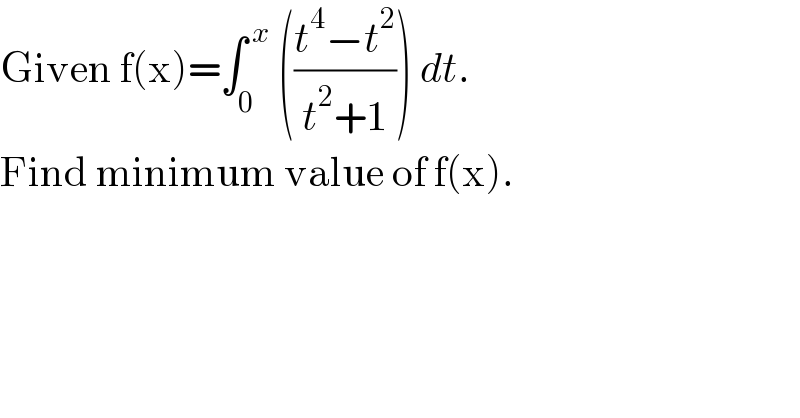Question Number 134391 by bramlexs22 last updated on 03/Mar/21

$$\mathrm{Given}\:\mathrm{f}\left(\mathrm{x}\right)=\int_{\mathrm{0}} ^{\:{x}} \:\left(\frac{{t}^{\mathrm{4}} −{t}^{\mathrm{2}} }{{t}^{\mathrm{2}} +\mathrm{1}}\right)\:{dt}. \\ $$$$\mathrm{Find}\:\mathrm{minimum}\:\mathrm{value}\:\mathrm{of}\:\mathrm{f}\left(\mathrm{x}\right). \\ $$
Answered by liberty last updated on 03/Mar/21
![Given f(x) = ∫_0 ^( x) [ ((t^4 −t^2 )/(t^2 +1))] dt. Find minimum value of f(x). (•) ((df(x))/dx) = ((x^4 −x^2 )/(x^2 +1)) = 0 x^2 (x−1) = 0 → { ((x=0)),((x=1)) :} (••) ((d^2 f(x))/dx^2 )∣_(x=1) = (((4x^3 −2x)(x^2 +1)−2x(x^4 −x^2 ))/((x^2 +1)^2 ))>0 for x=1 so minimum value is f(1) (•••) f(1)=∫_0 ^( 1) ((t^4 −t^2 )/(t^2 +1)) dt f(1)=∫_0 ^( 1) (t^2 −2+ (2/(t^2 +1)))dt f(1)= [(t^3 /3)−2t+2arctan t ]_0 ^1 f(1)= (1/3)−2+2((π/4))= (π/2)−(5/6)](https://www.tinkutara.com/question/Q134392.png)
$$\:\mathrm{Given}\:\mathrm{f}\left(\mathrm{x}\right)\:=\:\int_{\mathrm{0}} ^{\:{x}} \left[\:\frac{{t}^{\mathrm{4}} −{t}^{\mathrm{2}} }{{t}^{\mathrm{2}} +\mathrm{1}}\right]\:{dt}.\: \\ $$$$\mathrm{Find}\:\mathrm{minimum}\:\mathrm{value}\:\mathrm{of}\:\mathrm{f}\left(\mathrm{x}\right). \\ $$$$\left(\bullet\right)\:\frac{\mathrm{df}\left(\mathrm{x}\right)}{\mathrm{dx}}\:=\:\frac{\mathrm{x}^{\mathrm{4}} −\mathrm{x}^{\mathrm{2}} }{\mathrm{x}^{\mathrm{2}} +\mathrm{1}}\:=\:\mathrm{0}\: \\ $$$$\:\mathrm{x}^{\mathrm{2}} \left(\mathrm{x}−\mathrm{1}\right)\:=\:\mathrm{0}\:\rightarrow\begin{cases}{\mathrm{x}=\mathrm{0}}\\{\mathrm{x}=\mathrm{1}}\end{cases} \\ $$$$\left(\bullet\bullet\right)\:\frac{\mathrm{d}^{\mathrm{2}} \mathrm{f}\left(\mathrm{x}\right)}{\mathrm{dx}^{\mathrm{2}} }\mid_{\mathrm{x}=\mathrm{1}} \:=\:\frac{\left(\mathrm{4x}^{\mathrm{3}} −\mathrm{2x}\right)\left(\mathrm{x}^{\mathrm{2}} +\mathrm{1}\right)−\mathrm{2x}\left(\mathrm{x}^{\mathrm{4}} −\mathrm{x}^{\mathrm{2}} \right)}{\left(\mathrm{x}^{\mathrm{2}} +\mathrm{1}\right)^{\mathrm{2}} }>\mathrm{0}\:\mathrm{for}\:\mathrm{x}=\mathrm{1} \\ $$$$\mathrm{so}\:\mathrm{minimum}\:\mathrm{value}\:\mathrm{is}\:\mathrm{f}\left(\mathrm{1}\right) \\ $$$$\left(\bullet\bullet\bullet\right)\:\mathrm{f}\left(\mathrm{1}\right)=\int_{\mathrm{0}} ^{\:\mathrm{1}} \:\frac{\mathrm{t}^{\mathrm{4}} −\mathrm{t}^{\mathrm{2}} }{\mathrm{t}^{\mathrm{2}} +\mathrm{1}}\:\mathrm{dt} \\ $$$$\:\mathrm{f}\left(\mathrm{1}\right)=\int_{\mathrm{0}} ^{\:\mathrm{1}} \left(\mathrm{t}^{\mathrm{2}} −\mathrm{2}+\:\frac{\mathrm{2}}{\mathrm{t}^{\mathrm{2}} +\mathrm{1}}\right)\mathrm{dt}\: \\ $$$$\:\mathrm{f}\left(\mathrm{1}\right)=\:\left[\frac{\mathrm{t}^{\mathrm{3}} }{\mathrm{3}}−\mathrm{2t}+\mathrm{2arctan}\:\mathrm{t}\:\right]_{\mathrm{0}} ^{\mathrm{1}} \\ $$$$\:\mathrm{f}\left(\mathrm{1}\right)=\:\frac{\mathrm{1}}{\mathrm{3}}−\mathrm{2}+\mathrm{2}\left(\frac{\pi}{\mathrm{4}}\right)=\:\frac{\pi}{\mathrm{2}}−\frac{\mathrm{5}}{\mathrm{6}} \\ $$$$ \\ $$
